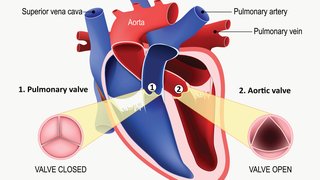
A landmark study has finally gotten to the heart of an age-old debate in the cardiology community: for patients with stable coronary artery disease, medication is just as effective as bypass or stenting to reduce heart attack, stroke and death risk.
The federally funded ISCHEMIA trial followed more than 5,000 patients over four years. Results show that managing the condition with beta blockers, calcium blockers, statins, aspirin therapy, and forms of nitroglycerin can allow more patients to avoid common and invasive bypass or stent procedures.
The ISCHEMIA results do not mean stents and bypass surgeries are ineffective. For certain patients, these procedures can be lifesaving. However, ISCHEMIA reminds us that the situation and the patient for which they’re recommended is tremendously important.
Additionally, the results, which were unveiled at the American Heart Association's 2019 annual conference, show that stable coronary blockages that cause chest pain and abnormal stress tests are often not immediate health risks.
The stent and bypass procedures did result in some improvement in quality of life related to fewer episodes of chest pain – a benefit that was most notable in those with frequent episodes of angina. However, since the condition is not immediately dangerous, it is often reasonable to try medications first; if the angina is not improved, then move to more invasive procedures.
The findings of ISCHEMIA (the International Study of Comparative Health Effectiveness with Medical and Invasive Approaches) should be a game-changer in cardiology. ISCHEMIA findings applied to patients with:
- Cholesterol plaque blocking one or more arteries by at least 70%
- Stable coronary blockages (low risk of plaque breaking open and causing a blood clot)
- No recent history of heart attacks
- Ischemia – the blockage(s) affect blood flow
- Angina on a regular basis and/or during a stress test
- No severe blockage in the left main coronary artery – this small subset of patients should still be referred for bypass surgery or stenting
That’s not to say angina is a condition to be ignored. Even infrequent or mild chest pain requires care from a doctor, and may require medication, to reduce the risk of negative outcomes. However, it is not typically an emergency akin to a heart attack or stroke.
This specific subset of patients does not have to select surgery right away to address angina or blockages. Rather, they can take time to try medical therapy first, saving money and limiting unnecessary procedures – which aligns with the patient-centered risk/benefit treatment approach UT Southwestern cardiologists already practice in treating patients with angina.
Importantly, these results apply only to patients with stable coronary disease. Those with unstable disease, including those with heart attacks and those with chest pains occurring with minimal or no physical activity, are at higher risk and often do better with stents or surgery than medications.
4 key takeaways from ISCHEMIA
Experiencing angina can be concerning, but when it occurs only with significant physical exertion, it is not immediately dangerous. Angina can occur daily and range from mild to moderate, and it doesn't necessarily increase the risk of a heart attack.
First, it's important to understand the difference between unstable and stable coronary artery blockages.
Unstable blockages typically occur when plaque breaks open or ruptures and a blood clot forms, blocking blood flow to the heart. Chest pain from unstable blockages can happen at unpredictable times, such as when you’re resting, and these types of blockages can lead to heart attacks.
Stable blockages (coronary artery disease) can linger for years and decades with low risk. ISCHEMIA validates this, and patients with stable blockages and manageable angina can feel more empowered in connecting with their doctors on the following four points.
1. There is more time to plan care.
Many patients think any type of chest pain means a heart attack is present or looming. But the study shows it is not an emergency; rather, it is a sign their symptoms and risk can be improved and there is time to try noninvasive options.
We can learn more about the patient, try medication combinations, and then determine whether it's necessary to intervene with a stent or bypass.
2. Patients can avoid excess testing.
Doctors sometimes order multiple stress tests after an abnormal one – they want to be certain about their diagnosis. Similarly, forgoing regular testing can be worrisome for some patients. In fact, we spend a fair amount of time discussing with patients why we’re not doing more tests.
However, ISCHEMIA shows that additional testing in this subset of patients likely provides no significant benefit. Since these patients don’t benefit from routine stents or surgery, there is less rationale to do tests to look for blockages and their consequences. And tests such as nuclear imaging or echocardiography for routine evaluation get expensive when they're not needed.
At UT Southwestern, we follow a risk/benefit protocol for ordering testing. What's the patient's immediate risk? What's the benefit of doing more tests?
Once we know that there’s no extremely high-risk situation, such as a weak heart muscle or blockages in high-risk locations, we can better assess whether additional testing is necessary. In those cases, medication and lifestyle modifications might be the most appropriate next steps.
3. Less intervention can potentially lower health care costs.
Medications used to treat non-life-threatening angina are almost all generic and covered by most insurances. Beta blockers, calcium blockers, and forms of nitroglycerin cost the patient pennies a day.
Surgical procedures such as stenting and bypass are much more expensive. By trying medication first, patients can potentially avoid the risks associated with surgery and reduce their expenditures – saving both patients and health systems substantial amounts of money.
4. Surgery is necessary – and effective – in certain cases.
Patients with unstable blockages, a history of heart attack, or severe angina that affects their daily lives can benefit from stenting or bypass. The role of these procedures is clearly established and beneficial for these patients, both for risk mitigation and quality of life.
Related reading: How PCI stenting can reduce chest pain and heart attack damage – without surgery
A few final notes
Between the ISCHEMIA intervention group and the medication group, there were no significant differences in overall deaths. The total number of heart attacks were also statistically insignificant.
However, between the two groups, there were timeline differences of when heart attacks occurred in patients. In the first couple years of the study, the risk of heart attack was higher in the stent/bypass group due to risks associated with the procedures. Approximately 18 to 24 months later – once normal blood flow was restored – the rate of heart attacks in the stents/bypass group declined.
It’s possible that if we follow participants longer, differences in heart attack rates might widen and more benefit might be seen in the stent/bypass group. The researchers who conducted this study are seeking additional grants from the National Institutes of Health to track patients' progress longer.
ISCHEMIA reiterates one of the core ideas of patient-centered cardiology: Creating customized treatment plans is paramount in providing the least invasive, most effective care.
If you or a loved one are concerned about angina or would like a second opinion regarding an abnormal stress test, call 214-645-8300 or request an appointment online.











